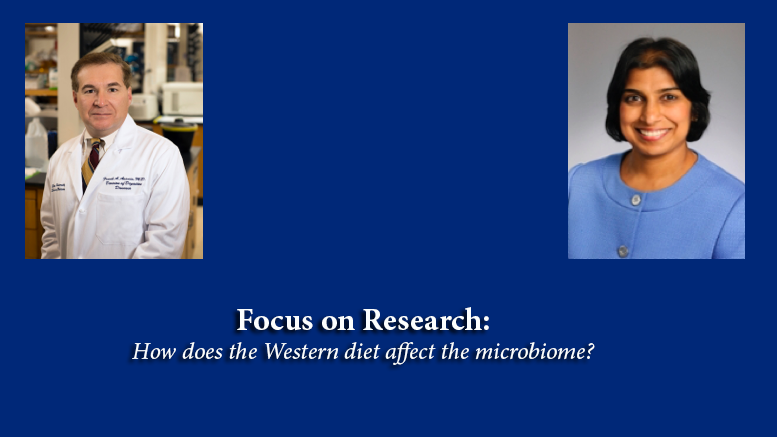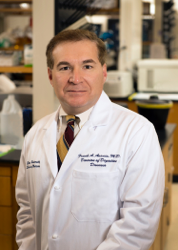Non-alcoholic fatty liver disease (NAFLD) is a leading cause of chronic liver failure in the United States, and its incidence is expected to increase in the near future. A significant portion of the U.S. population—many of whom are obese and have diabetes—will develop non-alcoholic steatohepatitis (NASH), a condition characterized by fat deposition and inflammation in the liver cells. These patients are at a higher risk of developing cirrhosis or hepatocellular carcinoma.
Drs. Frank Anania and Shanthi Srinivasan recently teamed up with other investigators at Emory and the University of Michigan to study the relationship between a “Western” (i.e. high-fat) diet, intestinal bacterial flora (i.e. microbiota), and NAFLD. They hypothesized that a diet high in fat, sugar, and cholesterol causes an imbalance in natural intestinal microbiota. This imbalance—called dysbiosis—leads to local inflammation and altered gut permeability. They recently extended these findings by showing that feeding a high-fat diet to mice lacking a protein important to intestinal epithelial permeability led to features in the liver also seen in NASH. The changes in liver histology were reversed by oral administration of antibiotics. These findings confirmed the link between a high-fat diet, intestinal microbiota and permeability, and NAFLD.
In the future, the investigators hope to develop therapies for NASH that work by restoring the intestinal barrier integrity and manipulating the gut microbiota.
Read related article: “Glial cell line-derived neurotrophic factor induced mice liver defatting: A novel strategy to enable transplantation of steatotic livers.” Liver Transpl. 2015 Dec 30.
Read more about Frank Anania, MD, AGAF, FACP
Dr. Frank Anania’s laboratory currently has two major focuses. At present, the lab studies hepatic fibrosis and examines the role of the matricellular protein periostin. Although periostin is most often associated with bone and embryologic development of the heart, their lab has demonstrated that it may be the master regulator of hepatic fibrosis by altering the liver stiffness of injured liver. Another major focus of Anania’s lab is related to the pathogenesis of non-alcoholic steatohepatitis (NASH). In the near future, NASH will be the most common etiology of cirrhosis. In conjunction with their collaborators, they have developed a powerful mouse model of NASH to study a unique microbiome associated with severe liver injury. In addition, the lab has additional ongoing projects related to alcoholic liver disease, and they are continuing their investigation of glucagon-like peptide 1 (GLP-1) and its pharmacologic grade analogues for the treatment of NASH in humans. In these studies, they are discovering how GLP-1 proteins can reduce fatty liver disease, which could help slow disease progression, especially in type 2 diabetes mellitus. The lab has a longstanding interest in training students and postdoctoral fellows, and they have extensive collaborations with many of the investigators in the newly awarded NIH Training Grant. Read more about the Anania Digestive Diseases lab.
Read more about Shanthi Srinivasan, MD
Dr. Srinivasan’s laboratory focuses on the factors affecting the survival and differentiation of the Enteric Nervous System (ENS). The ENS is an integrated network of neurons and glia within the wall of the gut that consists of the myenteric and submucosal plexus. Studies in her laboratory are performed in primary culture system of isolated rat embryonic enteric neuronal cells. The other main focus of her laboratory is how diabetes affects the enteric nervous system and thereby altering gastrointestinal motility. Read more about the Srinivasan Digestive Diseases lab
*If you are interested in investing in research, clinical care, and/or education within the Emory University School of Medicine’s Division of Digestive Diseases, please visit our website to learn how you can help.
Related Links
- Emory Division of Digestive Diseases
- Emory Department of Medicine
- Related article: “Glial cell line-derived neurotrophic factor induced mice liver defatting: A novel strategy to enable transplantation of steatotic livers.
- Read Dr. Anania’s Emory faculty bio
- Learn about the Anania Digestive Diseases lab
- Read Dr. Srinivasan’s Emory faculty bio
- Learn about the Srinivasan Digestive Diseases lab



